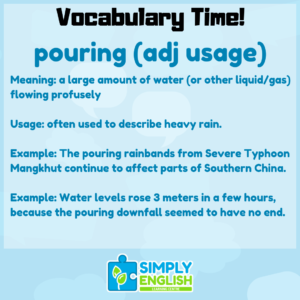
Meaning: a large amount of water (or other liquid/gas) flowing profusely.
Usage: often used to describe heavy rain.
Example: The pouring rainbands from Severe Typhoon Mangkhut continue to affect parts of Southern China.
Example: Water levels rose three meters in a few hours, because the pouring downfall seemed to have no end.
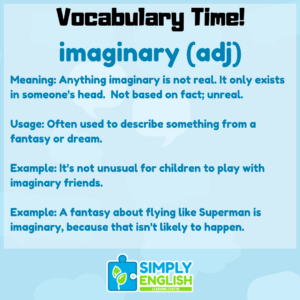
Meaning: Anything imaginary is not real. It only exists in someone’s head. Not based on fact; unreal.
Usage: Often used to describe something from a fantasy or dream.
Example: It’s not unusual for children to play with imaginary friends.
Example: A fantasy about flying like Superman is imaginary, because that isn’t likely to happen.
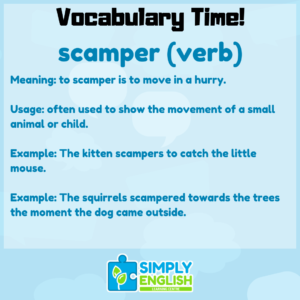
Meaning: to scamper is to move in a hurry.
Usage: often used to show the movement of a small animal or child.
Example: The kitten scampers to catch the little mouse.
Example: The squirrels scampered towards the trees the moment the dog came outside.
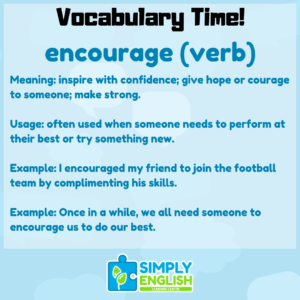
Meaning: inspire with confidence; give hope or courage to someone; make strong.
Usage: often used when someone needs to perform at their best or try something new.
Example: I encouraged my friend to join the football team by complimenting his skills.
Example: Once in a while, we all need someone to encourage us to do our best.
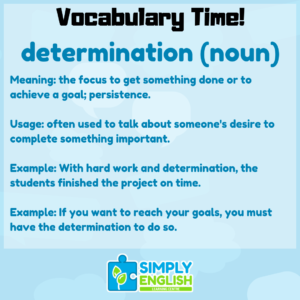
Meaning: the focus to get something done or to achieve a goal; persistence.
Usage: often used to talk about someone’s desire to complete something important.
Example: With hard work and determination, the students finished the project on time.
Example: If you want to reach your goals, you must have the determination to do so.
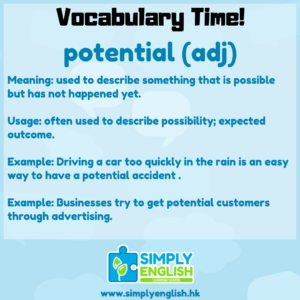
Meaning: used to describe something that is possible but has not happened yet.
Usage: often used to describe possibility; expected outcome.
Example: Driving a car too quickly in the rain is an easy way to have a potential accident.
Example: Businesses try to get potential customers through advertising.
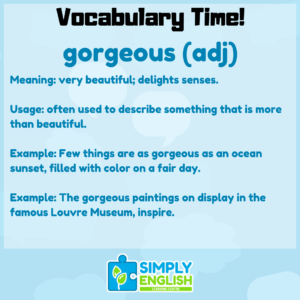
Meaning: very beautiful; delights senses.
Usage: often used to describe something that is more than beautiful.
Example: Few things are as gorgeous as an ocean sunset, filled with color on a fair day.
Example: The gorgeous paintings on display in the famous Louvre Museum, inspire more art.
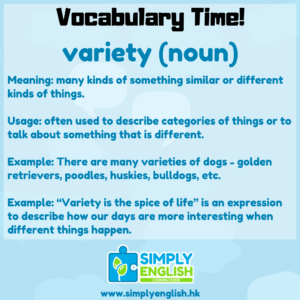
Meaning: many kinds of something similar or different kinds of things.
Usage: often used to describe categories of things or to talk about something that is different.
Example: There are many varieities of dogs – golden retrievers, poodles, huskies, bulldogs, etc.
Example: “Variety is the spice of life” is an expression to describe how our days are more interesting when different things happen.
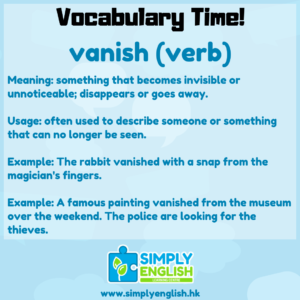
Meaning: something that becomes invisible or unnoticeable; disappears or goes away.
Example: The rabbit vanished with a snap from the magician’s fingers.
Example: A famous painting vanished from the museum over the weekend. The police are looking for the thieves.
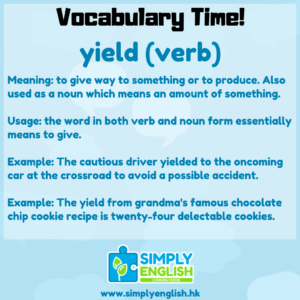
Meaning: to give way to something or to produce. Also used as a noun which means an amount of something.
Usage: the word in both verb and noun form essentially means to give.
Example: The cautious driver yielded to the oncoming car at the crossroad to avoid a possible accident.
Example: The yield from grandma’s famous chocolate chip cookie recipe is twenty-four delectable cookies.
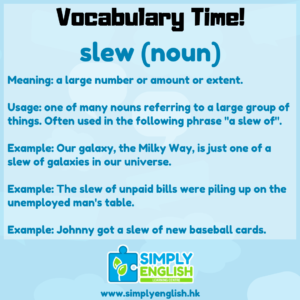
Meaning: a large number or amount or extent.
Usage: one of many nouns referring to a large group of things. Often used in the following phrase “a slew of”.
Example: Our galaxy, the Milky Way, is just one of a slew of galaxies in our universe.
Example: The slew of unpaid bills were piling up on the unemployed man’s table.
Example: Johnny got a slew of new baseball cards.
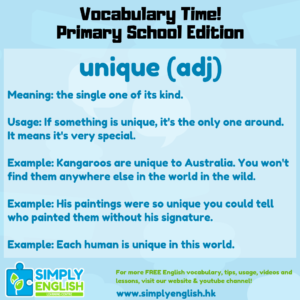
Meaning: the single one of its kind.
Usage: If something is unique, it’s the only one around. It means it’s very special.
Example: Kangaroos are unique to Australia. You won’t find them anywhere else in the world in the wild.
Example: His paintings were so unique you could tell who painted them without his signature.
Example: Each human is unique in this world.
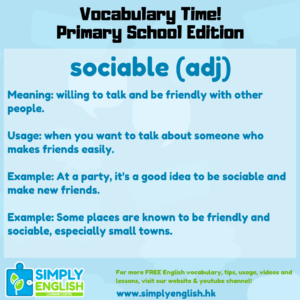
Meaning: willing to talk and be friendly with other people.
Usage: when you want to talk about someone who makes friends easily.
Example: At a party, it’s a good idea to be sociable and make new friends.
Example: Some places are known to be friendly and sociable, especially small towns.
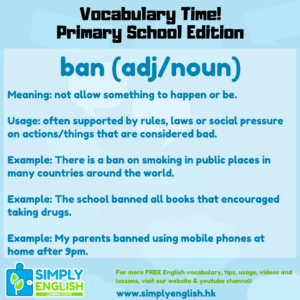
Meaning: not allow something to happen or be.
Usage: often supported by rules, laws or social pressure on actions/things that are considered bad.
Example: There is a ban on smoking in public places in many countries around the world.
Example: The school banned all books that encouraged taking drugs.
Example: My parents banned using mobile phones at home after 9pm.
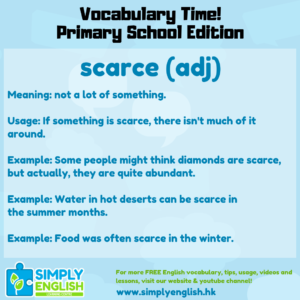
Meaning: not a lot of something.
Usage: If something is scarce, there isn’t much of it around.
Example: Some people might think diamonds are scarce, but actually, they are quite abundant.
Example: Water in hot deserts can be scarce in the summer months.
Example: Food was often scarce in the winter.
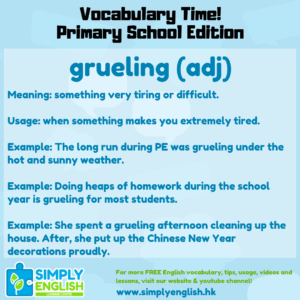
Meaning: something very tiring or difficult.
Usage: when something makes you extremely tired.
Example: The long run during PE was grueling under the hot and sunny weather.
Example: Doing heaps of homework during the school year is grueling for most students.
Example: She spent a grueling afternoon cleaning up the house. After, she put up the Chinese New Year decorations proudly.
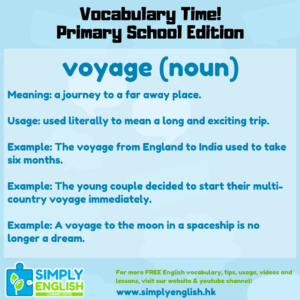
Meaning: a journey to a far away place.
Usage: used literally to mean a long and exciting trip.
Example: The voyage from England to India used to take six months.
Example: The young couple decided to start their multi-country voyage immediately.
Example: A voyage to the moon in a spaceship is no longer a dream.
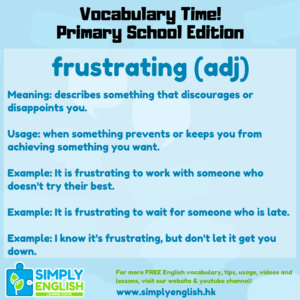
Meaning: describes something that discourages or disappoints you.
Usage: when something prevents or keeps you from achieving something you want.
Example: It is frustrating to work with someone who doesn’t try their best.
Example: It is frustrating to wait for someone who is late.
Example: I know it’s frustrating, but don’t let it get you down.
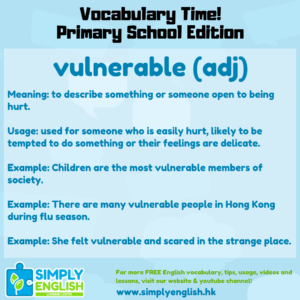
Meaning: to describe something or someone open to being hurt.
Usage: used for someone who is easily hurt, likely to be tempted to do something or their feelings are delicate.
Example: Children are the most vulnerable members of society.
Example: There are many vulnerable people in Hong Kong during flu season.
Example: She felt vulnerable and scared in the strange place.
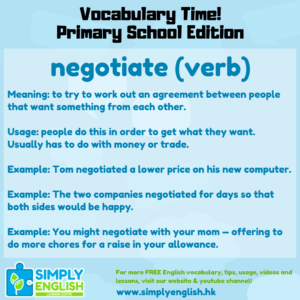
Meaning: to try to work out an agreement between people that want something from each other.
Usage: people do this in order to get what they want. Usually has to do with money or trade.
Example: Tom negotiated a lower price on his new computer.
Example: The two companies negotiated for days so that both sides would be happy.
Example: You might negotiate with your mom — offering to do more chores for a raise in your allowance.
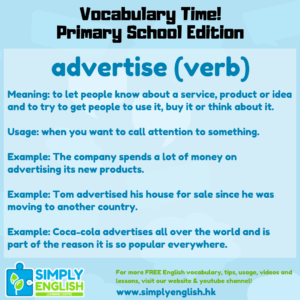
Meaning: to let people know about a service, product or idea and to try to get people to use it, buy it or think about it.
Usage: when you want to call attention to something.
Example: The company spends a lot of money on advertising its new products.
Example: Tom advertised his house for sale since he was moving to another country.
Example: Coca-cola advertises all over the world and is part of the reason it is so popular everywhere.
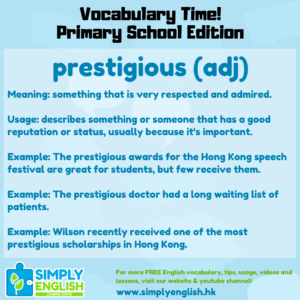
Meaning: something that is very respected and admired.
Usage: describes something or someone that has a good reputation or status, usually because it’s important.
Example: The prestigious awards for the Hong Kong speech festival are great for students, but few receive them.
Example: The prestigious doctor had a long waiting list of patients.
Example: Wilson recently received one of the most prestigious scholarships in Hong Kong.
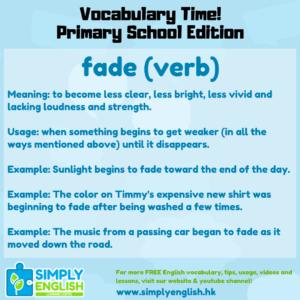
Meaning: to become less clear, less bright, less vivid and lacking loudness and strength.
Usage: when something begins to get weaker (in all the ways mentioned above) until it disappears.
Example: Sunlight begins to fade toward the end of the day.
Example: The color on Timmy’s expensive new shirt was beginning to fade after being washed a few times.
Example: The music from a passing car began to fade as it moved down the road.
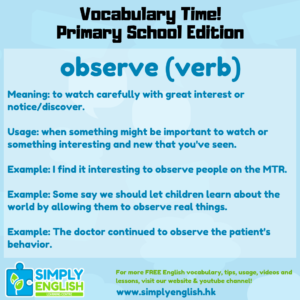
Meaning: to watch carefully with great interest or notice/discover.
Usage: when something might be important to watch or something interesting and new that you’ve seen.
Example: I find it interesting to observe people on the MTR.
Example: Some say we should let children learn about the world by allowing them to observe real things.
Example: The doctor continued to observe the patient’s behavior.
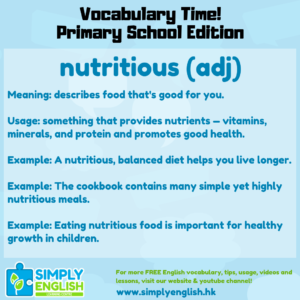
Meaning: describes food that’s good for you.
Usage: something that provides nutrients — vitamins, minerals, and protein and promotes good health.
Example: A nutritious, balanced diet helps you live longer.
Example: The cookbook contains many simple yet highly nutritious meals.
Example: Eating nutritious food is important for healthy growth in children.
For more vocabulary lists, check these out!
Secondary School List #1
Secondary School List #2
Secondary School List #3
Primary School List #1
Primary School List #2
100+ Most Important Words – HKDSE
Tips for the English DSE
Need help preparing for the HKDSE? Check out our English DSE course!
Need help preparing for the IELTS? Check out our IELTS course!
